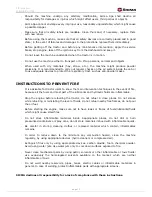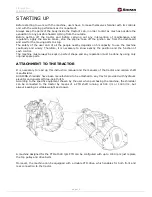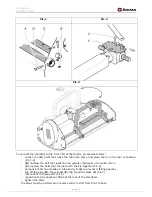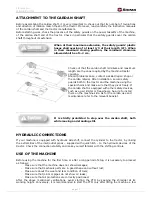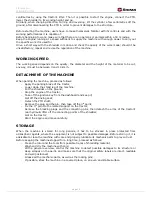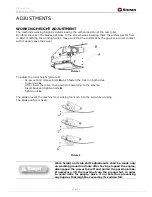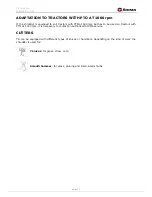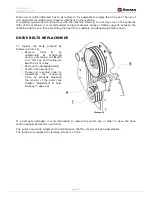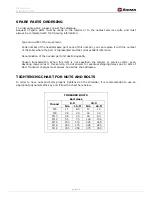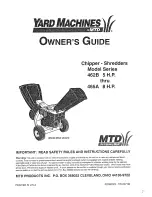
Sicma S.p.A.
Miglianico (CH)
page 24
MAINTENANCE
Maintenance is a fundamental operation to extend life and performances of any agricultural vehicle;
taking care of the machine grants you not only a good work execution, but also a longer life of the
whole equipment and a greater safety on the workplace.
The operating times indicated on this manual have just an informative character and are referred to
normal conditions of use; they can thus undergo variations according to the type of service, to the
more or less dusty environment, to seasonal factors, etc
Before starting any maintenance intervention, it is necessary to proceed with the following
operations:
-
Position the machine on a stable and even ground during maintenance interventions;
-
Stop the engine of the tractor, apply the parking brake and take off the ignition key from
the dashboard;
-
Always use the appropriate personal protective equipment (safety footwear, protective
clothing and gloves, dust mask);
-
Arrange all the interventions required to prevent injuries, according to the operation in
progress;
-
If the cleaning is made with compressed air, it is necessary to protect eyes by wearing
safety glasses;
-
Do not carry out reparations without having the proper competence. Follow instructions or,
should there be no instructions available, contact the supplier or address your needs to
qualified operators;
-
Do not lift up the machine by using hooking points which are not those indicated by the
present manual;
-
Make sure that the lifting device suits properly the maintenance operations, by complying
with safety norms;
-
Do not keep the tractor’s engine on inside close places without a ventilation system, where
toxic emissions gathering in the air cannot be moved away;
-
Do not make the skin get in touch with lubricants for too long, because they might cause
irritations or other kinds of disorder;
-
In case of accidental contact with eyes, wash them with plenty of water;
-
Be extremely careful with exhausted oil, which might reach very high temperatures;
-
Do not weld inside close places or not ventilated rooms;
-
Do not weld on painted surfaces or nearby, in order to prevent the production of toxic
fumes. Take off the paint by using specific removers, then wash the surface and let it dry;
-
Before intervening, let the pressure come out of the circuits;
-
Never use hands to detect leaks of fluids under pressure;
-
When leaking, fluids under pressures may come in contact with skin and eyes, thus causing
very serious damages.



